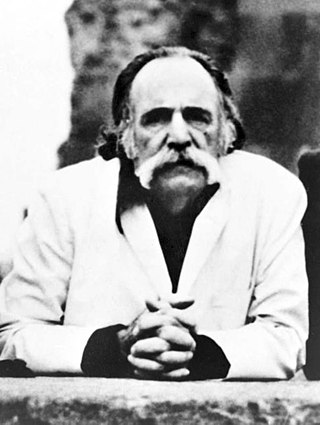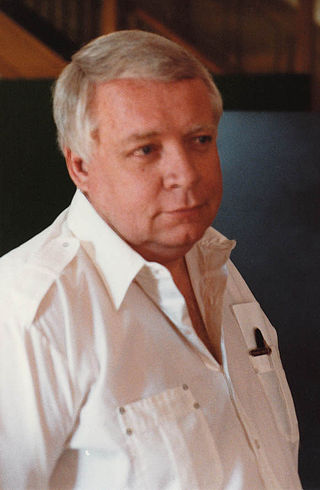
Cyril M. Kornbluth was an American science fiction author and a member of the Futurians. He used a variety of pen-names, including Cecil Corwin, S. D. Gottesman, Edward J. Bellin, Kenneth Falconer, Walter C. Davies, Simon Eisner, Jordan Park, Arthur Cooke, Paul Dennis Lavond, and Scott Mariner.

William Saroyan was an Armenian-American novelist, playwright, and short story writer. He was awarded the Pulitzer Prize for Drama in 1940, and in 1943 won the Academy Award for Best Story for the film The Human Comedy. When the studio rejected his original 240-page treatment, he turned it into a novel, The Human Comedy. Saroyan is regarded as one of the greatest writers of the 20th century.

Whittaker Chambers was an American writer and intelligence agent. After early years as a Communist Party member (1925) and Soviet spy (1932–1938), he defected from the Soviet underground (1938), worked for Time magazine (1939–1948), and then testified about the Ware Group in what became the Hiss case for perjury (1949–1950), often referred to as the trial of the century, all described in his 1952 memoir Witness. Afterwards, he worked as a senior editor at National Review (1957–1959). US President Ronald Reagan awarded him the Presidential Medal of Freedom posthumously in 1984.

Algirdas Jonas "Algis" Budrys was a Lithuanian-American science fiction author, editor, and critic. He was also known under the pen names Frank Mason, Alger Rome, John A. Sentry, William Scarff, and Paul Janvier. He is known for the influential 1960 novel Rogue Moon.

Robert Stuart Fitzgerald was an American poet, literary critic and translator whose renderings of the Greek classics "became standard works for a generation of scholars and students". He was best known as a translator of ancient Greek and Latin. He also composed several books of his own poetry.
Chester Simon Kallman was an American poet, librettist, and translator, best known for collaborating with W. H. Auden on opera librettos for Igor Stravinsky and other composers.

Ross S. Bagdasarian, known professionally by his stage name David Seville, was an American singer, songwriter, record producer, and actor, best known for creating the cartoon band Alvin and the Chipmunks. Initially a stage and film actor, he rose to prominence in 1958 with the songs "Witch Doctor" and "The Chipmunk Song ", which both became Billboard number-one singles. He produced and directed The Alvin Show, which aired on CBS in 1961–62.

Robert Emmett Cantwell, known as Robert Cantwell, was a novelist and critic. His first novel, Laugh and Lie Down (1931) is an early example, twenty years before Jack Kerouac, of the American classic genre the "road novel", and also an important example of the "Depression novel" period genre. His most notable work, The Land of Plenty, focuses on a lumber mill in a thinly disguised version of his hometown in Washington state.
John Thomas McManus was an American journalist active in progressive politics in the 1950s and 1960s best known as co-founder of the National Guardian, a left-leaning newspaper.
William Nuelsen Witney was an American film and television director. He is best remembered for the action films he made for Republic Pictures, particularly serials: Dick Tracy Returns, G-Men vs. the Black Dragon, Daredevils of the Red Circle, Zorro's Fighting Legion, and Drums of Fu Manchu. Prolific and pugnacious, Witney began directing while still in his 20s, and continued working until 1982.
Mario Serandrei was an Italian film editor and screenwriter.
This is a bibliography of books, plays, films, and libretti written, edited, or translated by the Anglo-American poet W. H. Auden (1907–1973). See the main entry for a list of biographical and critical studies and external links.
Harvey Breit was an American poet, editor, and playwright as well as reviewer for The New York Times Book Review from 1943 to 1957.
Charles Christian Wertenbaker. was an American journalist for Time, and author.
Duncan Norton-Taylor was an American journalist who was a senior editor at Time magazine and managing editor at Fortune magazine from the 1940s through the 1960s.
Owen Marks was an English film editor who worked in the US.
Thomas Stanley Matthews was an American magazine editor, journalist, and writer. He served as editor of Time magazine from 1949 to 1953.
Walter Wischniewsky was a German film editor who worked on over a hundred productions during his career. Wischniewsky also sometimes worked as an assistant director. Wischniewsky began his career during the Nazi era, but most productions he worked on were post-Second World War. He edited several rubble films, including The Berliner (1948). During the 1950s and 1960s he became one of the mainstays of German commercial cinema, working on the long-running Edgar Wallace and Karl May series. Wischniewsky edited Fritz Lang's Indian-shot The Indian Tomb and The Tiger of Eschnapur.
Calvin Fixx, born Calvin Henry Fix, was an American journalist and editor, lifelong friend of Robert Cantwell and friend of Whittaker Chambers, both fellow editors at Time magazine. All three were either Marxist or communist during the 1920s and 1930s and then became anti-communists by 1939.

Al Clark was a prolific American film editor whose career spanned four decades, most of which was spent at Columbia Pictures. He was nominated for 5 Academy Awards and 1 Emmy during his career. He is credited with editing over 120 films, and towards the end of his career, in the 1960s, he also edited several television series.











